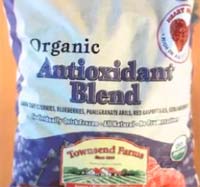The Costco-Townsend Farms hepatitis A outbreak continues to grow. There are now 87 CDC-confirmed cases of acute hepatitis A infections that may be linked to eating Townsend Farms Organic Antioxidant Blend frozen berry mix sold at Costco stores.
 The CDC numbers include people sickened in eight states: Arizona, California Colorado, Hawaii, Nevada, New Mexico, Utah and Washington. To date, lawsuits have been filed in Arizona and California.
The CDC numbers include people sickened in eight states: Arizona, California Colorado, Hawaii, Nevada, New Mexico, Utah and Washington. To date, lawsuits have been filed in Arizona and California.
The CDC has epidemiological information on 68 of the outbreak victims. These people answered questions about their illness and the food they ate in the weeks leading up to their illness. What the CDC found was that of these 68, 45 (66%) are women, the ages of those sickened are from 2 – 84 years, and 46 (70%) reported eating “Townsend Farms Organic Antioxidant Blend” frozen berry and pomegranate mix that had been purchased at a Costco store.
36 of the 68 people interviewed have been hospitalized with liver inflammation and other complications, and no deaths have been reported. Hepatitis A can cause liver failure and is sometimes fatal.
On June 3, 2013, Townsend Farms, Inc. of Fairview, Oregon recalled certain lots of its frozen Organic Antioxidant Blend because it has the potential to be contaminated with hepatitis A virus. An attorney for Townsend Farms and the CDC have implicated pomegranate seeds in the berry mix as the source of the outbreak. The pomegranate seeds were imported from Turkey.
The recalled berry bled was sold at Costco warehouse stores under the product name “Townsend Farms Organic Antioxidant Blend, 3 lb. bag” with UPC code 0 78414 404448. The recalled codes are located on the back of the package with the words “BEST BY”; followed by the code T012415 sequentially through T053115, followed by a letter. All of these letter designations are included in this recall for the lot codes listed above.
The product was also sold at Harris Teeter stores from April 19 until May 7, 2013, under the product name “Harris Teeter Organic Antioxidant Berry Blend, 10 oz. bag” with UPC code 0 72036 70463 4. The correct “Lot” and “best by” codes are as follows: Lot Codes T041613E, T041613C and a “BEST BY” code of 101614. No illnesses have been associated with the product sold at Harris Teeter stores.





How did the hepatitis A get on the seeds? How does one person cause 87 illnesses in 8 states?
We don’t know the answer yet, but this article may help explain the problem.
Do they use these same berries in the smoothies you purchase at the snack bar?
You’ll have to ask.
It is troubling to know that the package does not indicate the source of ingredients in the mix and thus gives false impression of it all being grown and processed in US at Townsend Farms. I read labels on all food items to check if the ingredients are coming from other countries and if so I do not buy that, as much as possible. In this case, it is not right that we allow these products to be sold without complete information.
The problem is that with “country of origin” labeling, if a food is “processed” in any way in the United States, the country where that food came from doesn’t have to be on the label. In the rule published in 2009, “a covered commodity (such as fruit) that has been combined with at least one other covered commodity is considered a processed food item and is therefore exempt from country of origin labeling requirements.” There has been controversy over COOL as it applies to meat.
Thanks Linda for the clarification and details on COOL.
I am aghast on learning more about COOL. The “processed” definition is so wide that it covers majority of food items sold in our stores. I wish more people are educated about it as most of us implicitly trust that a label is what it obviously says. The reality could not be farther from the truth because a label is just a false sense of assurance to the customers. It may not be a bad idea for our schools to cover this information as a part of education where all prevailing and related rules/laws related to food are explained to kids. The assignments given to students should ensure that parents get involved as well.
I am thankful that my parents taught me not to buy any processed/mixed food from grocery stores (as much as possible). We buy mainly individual fruits/vegetables, mostly from local farmers’ market where we can meet the owner of the store to find out the source.
Thanks again for your column.
Fully agree. I have spent more to purchase it for my family and chidlren BECAUSE I thought it was US organic